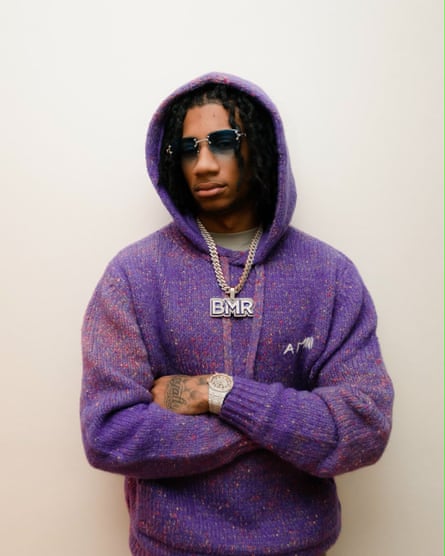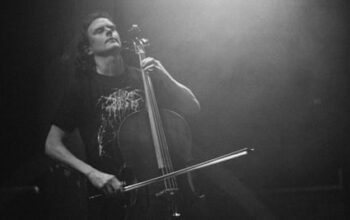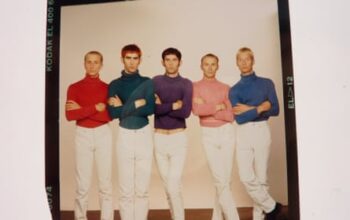Shami Chakrabarti, a lawyer, along with DJ Annie Mac and Labour MPs Nadia Whittome and Kim Johnson, are showing their support for a new campaign that aims to alter the use of rap lyrics as evidence in criminal hearings in the UK.
A study by the University of Manchester revealed that within the past three years, a minimum of 240 individuals in the United Kingdom have had rap music utilized as evidence in criminal court cases. This includes accusations of belonging to a gang and purported admissions of illegal actions within the lyrics. Notable instances include the popular artist Digga D being issued a criminal behavior order that prohibits him from using particular names, locations, and subjects in his songs, as well as prosecutors trying to employ drill music lyrics as evidence in a murder trial against rapper Unknown T, who was ultimately found not guilty.
The matter is currently being investigated in the United States. Recently, Ural Glanville, the judge presiding over the racketeering case against popular Atlanta rapper Young Thug, made a ruling that allows lyrics to be utilized as evidence against him. Glanville informed the rapper’s defense team that the songs could be used to demonstrate their involvement in other activities. He stated, “I do not see this as a violation of free speech.”
Whittome, who represents Nottingham East as a member of parliament, discusses a hypothetical situation where an individual is falsely accused of a crime and a song they wrote with friends is used as evidence to prove criminal intent. She expresses concern that this type of scenario is occurring, particularly in regards to rap and grime music which is a significant aspect of our culture and enjoyed by many. Whittome believes this practice is unjust, perpetuates racist stereotypes, and could lead to wrongful convictions.
In June, a representative from the Crown Prosecution Service addressed the topic with the Guardian and stated that they have never prosecuted someone solely based on their involvement in drill/rap music. However, if drill/rap music is relevant to a case involving a suspect, it may be used as evidence.

Whittome intends to introduce a bill in the near future, likely in the upcoming year, which has been created by Art Not Evidence, a campaign group. The goal of the bill is to adjust the law and increase the standard for rap and other types of artistic expression to be considered as valid evidence.
In late 2022, a team consisting of lawyers, academics, and music industry experts came together to establish Art Not Evidence. The goal of this organization is to challenge the practice of utilizing police officers as experts in rap music to interpret evidence against a defendant. Additionally, they aim to promote a shift in cultural perspective where genres like drill and grime are recognized as legitimate forms of art.
An open letter has been written and is open for signing by anyone starting today. Notable individuals who have already signed include DJ Annie Mac, Lady Chakrabarti, Kim Johnson (Labour MP for Liverpool Riverside), and Eithne Quinn, lead on the University of Manchester’s Prosecuting Rap project.
Attorney Keir Monteith, a key figure in the Art Not Evidence campaign, explains the urgent necessity for a shift in the utilization of rap music during serious criminal trials.
“Nearly ten years ago, I was involved in a murder trial,” he clarifies. “The prosecution had evidence such as forensics, CCTV footage, witness testimonies, and photographs. However, during the trial, they introduced a new statement from a police officer regarding my client’s supposed involvement in a rap video. This revelation caught me off guard.”
As someone who works as a defense attorney for criminals, I was surprised to learn that the prosecution in a murder trial was using music as evidence. While rap is a form of music and expression, it should not be considered as concrete evidence. In a murder case, the focus should be on tangible evidence such as forensic evidence, eyewitness accounts, and CCTV footage.
According to Chakrabarti, who has signed Art Not Evidence’s public statement, the inclusion of rap music in legal proceedings could result in a “triple abuse of authority”.
According to her, if this evidence is misused, it unfairly assumes that cultural influences automatically lead to criminal behavior. This is similar to assuming someone is a member of the IRA just because they enjoy rebel songs, or assuming someone is part of the mafia because they like the Godfather movies. This kind of thinking is absurd and can harm public trust, especially among young Black individuals.
The second form of mistreatment involves racism and stereotyping. The third issue is the belief that law enforcement will portray themselves as knowledgeable witnesses in a pseudo-scientific approach to linking music with criminal behavior.
The goal of Art Not Evidence is to prohibit the use of rap lyrics, videos, or similar content as evidence, unless it is directly linked to other forms of proof such as DNA, CCTV footage, forensics, or eyewitness accounts. They advocate for thorough scrutiny of the connection between rap material and other evidence before it is presented to a jury.
In a separate murder trial, Monteith states that the prosecution presented a rap music video as evidence. This was deemed irrelevant and biased. The judge suggested to the jury that if the defendant appeared in the video or had it in their possession, they must be a member of a violent gang. This assumption is completely incorrect.
Abenaa Owusu-Bempah, a researcher at the London School of Economics, is advocating for more stringent regulations regarding the use of lyric-based evidence. She has observed that such evidence is not being thoroughly examined, resulting in the use of music, lyrics, and videos unrelated to the charged offense as evidence for factors like gang affiliation and criminal motives.
Elli Brazzill, the founder of the campaign, clarifies that they receive criticism from individuals who claim that rap and drill music and videos feature violent language and visuals. Some argue that in drill music, specific names are mentioned and controversial statements are made. The campaign does not deny that this occurs, but insists on a thorough evaluation process to ensure that the content is relevant to the case at hand and is not used in isolation.
Owusu-Bempah concurs, stating: “A large portion of rap is fabricated, exaggerated, and exaggerated, so it’s important to ensure that when it’s utilized, it’s a trustworthy statement of truth.”
However, she contends that this type of music is sometimes used carelessly by law enforcement and attorneys, often through the perspective of police officers who are utilized as rap authorities by the prosecution.
The music may have been written months or years before the supposed crime. The term “ting” is commonly used, as a shortened version of “thing,” and is frequently used to refer to girls. However, in certain instances, it is implied that “ting” refers to a gun in the lyrics – which may not have been the intended meaning.
During the month of June, Michael Railton oversaw a Met police program to train officers as expert witnesses. He emphasized that they were expected to maintain a high level of independence and that their goal was not to solely police one specific community or group. He also expressed his desire for rap artists to produce socially responsible music that does not contribute to the negative impact on their community and personal lives.
The Art Not Evidence movement shares a comparable philosophy with the Art on Trial: Protect Black Art movement in the United States, which has received support from popular figures such as Jay-Z and Megan Thee Stallion. In September 2022, California passed a law prohibiting the use of rap lyrics as evidence in trials.
Brazzill believes that if the complicated American system can address this issue successfully with its many states, then other countries can do the same. He urges the music industry to pay closer attention to this issue, as it affects those who make a living from rap and drill music. However, when it comes to the law, the industry remains silent.
Source: theguardian.com


